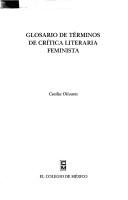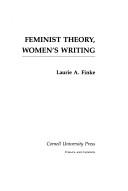| Listing 1 - 4 of 4 |
Sort by
|

ISBN: 9681207246 6075640738 Year: 1997 Publisher: El Colegio de México
Abstract | Keywords | Export | Availability | Bookmark
 Loading...
Loading...Choose an application
- Reference Manager
- EndNote
- RefWorks (Direct export to RefWorks)
A medida que se desarrolla el pensamiento feminista, y la teoría literaria consiguiente gana espacios en América Latina y en México, en particular, brota la apremiante necesidad de realizar un acercamiento a los textos teóricos y críticos de anglosajonas y francesas, que han ampliado el dominio conceptual en estas áreas del conocimiento. Con el objeto de tender un puente lingüístico entre los términos que revisten estas categorías de análisis y su tradición al español, Cecilia Olivares reúne y examina en esta obra, veinticinco vocablos feministas que sirven como fundamento a numerosas reflexiones feministas sobre la escritura y producción textual.

ISBN: 0801425476 9781501726255 1501726250 0801497841 9780801497841 9780801425479 1501727818 1501726269 Year: 1992 Publisher: Ithaca, N.Y. Cornell University Press
Abstract | Keywords | Export | Availability | Bookmark
 Loading...
Loading...Choose an application
- Reference Manager
- EndNote
- RefWorks (Direct export to RefWorks)
In this rewarding book, Laurie A. Finke challenges assumptions about gender, the self, and the text which underlie fundamental constructs of contemporary feminist theory. She maintains that some of the key concepts structuring feminist literary criticism need to be reexamined within both their historical context and the larger framework of current theory concerning language, representation, subjectivity, and value.
Thematology --- Psychological study of literature --- Feminism and literature. --- Feminist theory. --- LITERARY CRITICISM / Feminist. --- Feminism --- Feminist philosophy --- Feminist sociology --- Theory of feminism --- Literature --- Philosophy --- Women authors --- Literature: history & criticism --- Literature and feminism
Book
ISBN: 9048554314 9463721460 Year: 2023 Publisher: Amsterdam : Amsterdam University Press,
Abstract | Keywords | Export | Availability | Bookmark
 Loading...
Loading...Choose an application
- Reference Manager
- EndNote
- RefWorks (Direct export to RefWorks)
Scholarship on early Medieval England has seen an exponential increase in scholarly work by and about women over the past 20 years, but the field has remained peculiarly resistant to the transformative potential of feminist critique. Since 2016, Medieval Studies has been rocked by conversations about the state of the field, shifting from #MeToo to #WhiteFeminism to the purposeful rethinking of the label 'Anglo-Saxonist'. This volume takes a step toward decentring the traditional scholarly conversation with 13 essays by American, Canadian, European, and UK professors, along with independent scholars and early career researchers from a range of disciplinary perspectives. The theoretical and political commitments of this volume comprise one strand of a multivalent effort to rethink the parameters of the discipline and to create a scholarly community that is innovative, inclusive, and diverse.
English literature --- Feminist literary criticism. --- Women and literature --- HISTORY / Europe / Great Britain / Middle Ages (449-1066). --- History and criticism. --- History --- Medieval, Old English, women, gender. --- Literary criticism, Feminist --- Feminism and literature --- Feminist criticism --- Medieval --- gender --- Old English --- women
Book
ISBN: 0824870832 0824860756 1441671471 0824833872 0824882512 Year: 2010 Publisher: Honolulu : University of Hawai'i Press,
Abstract | Keywords | Export | Availability | Bookmark
 Loading...
Loading...Choose an application
- Reference Manager
- EndNote
- RefWorks (Direct export to RefWorks)
The Other Women’s Lib provides the first systematic analysis of Japanese literary feminist discourse of the 1960's—a full decade before the "women’s lib" movement emerged in Japan. It highlights the work of three well-known female fiction writers of this generation (Kono Taeko, Takahashi Takako, and Kurahashi Yumiko) for their avant-garde literary challenges to dominant models of femininity. Focusing on four tropes persistently employed by these writers to protest oppressive gender stereotypes—the disciplinary masculine gaze, feminist misogyny, "odd bodies," and female homoeroticism—Julia Bullock brings to the fore their previously unrecognized theoretical contributions to second-wave radical feminist discourse. In all of these narrative strategies, the female body is viewed as both the object and instrument of engendering. Severing the discursive connection between bodily sex and gender is thus a primary objective of the narratives and a necessary first step toward a less restrictive vision of female subjectivity in modern Japan. The Other Women’s Lib further demonstrates that this "gender trouble" was historically embedded in the socioeconomic circumstances of the high-growth economy of the 1960's, when prosperity was underwritten by an increasingly conservative gendered division of labor that sought to confine women within feminine roles. Raised during the war to be "good wives and wise mothers" yet young enough to take advantage of the opportunities presented to them by Occupation-era reforms, the authors who fueled the 1960's boom in women’s literary publication staunchly resisted normative constructions of gender, crafting narratives that exposed or subverted hegemonic discourses of femininity that relegated women to the negative pole of a binary opposition to men. Their fictional heroines are unapologetically bad wives and even worse mothers; they are often wanton, excessive, or selfish and brazenly cynical with regard to traditional love, marriage, and motherhood. The Other Women’s Lib affords a cogent and incisive analysis of these texts as feminist philosophy in fictional form, arguing persuasively for the inclusion of such literary feminist discourse in the broader history of Japanese feminist theoretical development. It will be accessible to undergraduate audiences and deeply stimulating to scholars and others interested in gender and culture in postwar Japan, Japanese women writers, or Japanese feminism.
Japanese fiction --- Women in literature. --- Feminist literary criticism --- Gender identity in literature. --- Human body in literature. --- Women --- Human females --- Wimmin --- Woman --- Womon --- Womyn --- Body, Human, in literature --- Human figure in literature --- Literary criticism, Feminist --- Woman (Christian theology) in literature --- Women in drama --- Women in poetry --- History and criticism. --- Women authors --- Identity --- Feminism and literature --- Feminist criticism --- Japanese literature --- Identity. --- Females --- Human beings --- Femininity
| Listing 1 - 4 of 4 |
Sort by
|

 Search
Search Feedback
Feedback About UniCat
About UniCat  Help
Help News
News